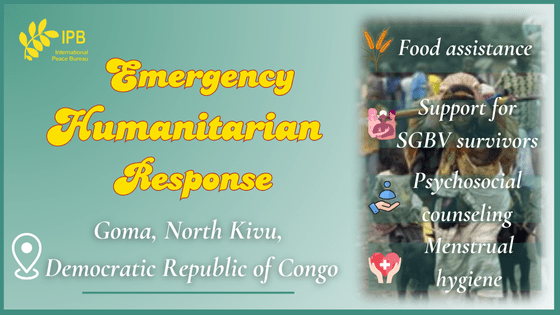The humanitarian situation in Goma, North Kivu, Democratic Republic of Congo has reached critical levels, and urgent intervention is needed to support the most vulnerable populations. Over 1.7 million people in North Kivu are displaced, with many living in dire conditions without access to basic services. Women, children, and the elderly are suffering from extreme food insecurity, lack of healthcare, and inadequate shelter. The constant threat of sexual and gender-based violence (SGBV) makes Goma one of the most dangerous places for women and girls.
Your support can provide urgent aid to those who need it the most:
- Emergency Food Assistance: Providing essential food aid to reduce hunger and prevent malnutrition among vulnerable individuals.
- Support for SGBV Survivors: Establishing safe spaces and offering medical, psychological, and legal support for survivors of sexual and gender-based violence.
- Psychosocial Support: Offering counseling and trauma healing programs to help individuals cope with the psychological impacts of the crisis.
- Menstrual Hygiene Management: Distributing washable sanitary pads to ensure women and girls have access to safe and sustainable menstrual hygiene products.
Support the GoGetFunding Campaign by the Women Concern (WOCO) in DRC, an organization member of IPB, and published by Rokhsaneh Madeira.
We need your help to make a meaningful impact in the lives of those who need it the most. Join us in providing essential assistance to the people of Goma. Together, we can offer hope and relief during this critical time.
Link to Donate: Emergency Humanitarian Response in Goma, North Kivu
Full Campaign Background:
The humanitarian situation in Goma, North Kivu, remains critical due to the ongoing armed conflict, widespread displacement, and extreme lack of access to basic services. As of early 2025, over 1.7 million people in North Kivu are displaced, with more than 400,000 living in the city of Goma alone. These internally displaced persons (IDPs) are primarily women, children, and the elderly, who are suffering from food insecurity, lack of healthcare, and inadequate shelter. The constant threat of violence, including sexual and gender-based violence (SGBV), has made Goma one of the most dangerous places for women and girls.
The severe lack of food and essential services in Goma is a significant driver of vulnerability, particularly for women and girls. In desperate circumstances, many women and girls resort to sex in exchange for food and other necessities, exposing them to sexual exploitation and violence. Adolescents, in particular, are often forced into transactional sex, which has led to an alarming increase in cases of SGBV, sexually transmitted diseases (STDs), and HIV transmission. According to local reports, there has been a sharp rise in sexual exploitation in the past year, with many young girls and adolescents becoming victims of sexual violence and exploitation as they struggle to meet basic survival needs. These dire circumstances not only increase the trauma faced by survivors but also contribute to a broader public health crisis, including higher rates of HIV and other STDs.
In addition to sexual exploitation, the lack of proper menstrual hygiene management (MHM) compounds the vulnerability of women and girls, leading to health risks and further marginalization. Without access to sanitary products, many are forced to use unhygienic alternatives, which exposes them to infections and affects their dignity. This situation urgently calls for a comprehensive response that not only addresses food security but also ensures protection for survivors of SGBV, provides psychosocial support, and facilitates access to safe menstrual hygiene products for displaced women and girls.
Check out:

